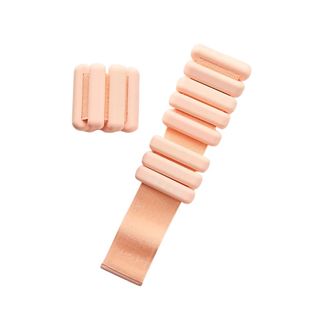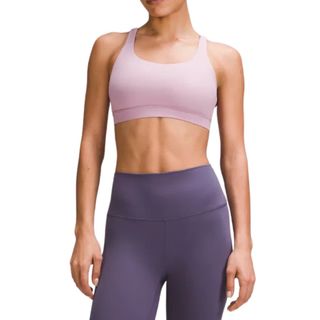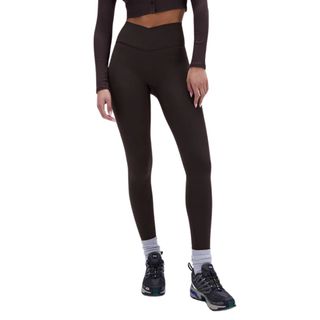In interesting new research this week, a study of nearly 90,000 individuals found that people who only worked out at the weekend might be experiencing the same health benefits as those who workout more regularly during the week.
The study, published in the scientific journal Circulation, looked at data from UK-based participants who wore wrist accelerometers (aka fitness trackers that logged their movement and how long they moved for each day).
Their findings? Perhaps surprisingly, that both those who opted for weekend workouts and those who worked out regularly during the week were at a lower risk of developing disease than those they classified as "inactive." "Associations appear similar, whether physical activity follows a weekend warrior pattern or is spread more evenly throughout the week," the authors of the study shared.
In layman's terms, this means they concluded that working out one or two times a week at the weekend might provide a similar health boost to those who work out more regularly - say four or five times - throughout the week.
And it's not the first study to conclude similar, either. Back in 2022, one JAMA study found that fitting in 150 minutes of exercise a week - whether that be during the weekdays, or all in one go at the weekend - was equally beneficial for you.
Here at MC UK, we're all about finding a workout routine that works for you, your fitness level and your lifestyle. That said, as a Health Editor with nearly a decade of experience, I've always been an advocate for daily movement, whether that be a walk or something slightly more high intensity, as a core component of a healthy lifestyle.
And NHS guidelines back me up, with their "Live Well" guidelines recommending we "spread exercise evenly over 4 to 5 days a week, or every day," and aim for a mix of both cardio and strength training.
If you're someone who finds working out during the week near impossible because you're so busy, or someone who's curious to know whether your regular routine may not be the most beneficial, keep scrolling. Below, we've quizzed top pros for their definitive take. Keen to learn more while you're here? Don't miss our guides to how many workout vs rest days to aim for, how beneficial gym breaks can be, and a PT's advice on the best workout split for improving your fitness. Wondering, how much do I need to workout to see results? We've got an expert epxlainer on that, too.
What's better for you - weekday or weekend workouts? Experts explain
What are the pros of weekday workouts?
Alasdair Nicoll, personal trainer and gym instructor at The Fitness Group, reckons that the main benefit of weekday workouts is that it frees up your weekends and means you can be more flexible. "You’ll have the freedom to rest, spend time with friends and family, or pursue hobbies without feeling like you’re cramming in a workout," he explains.
"It’s also a great way to manage stress which tends to build up more during the week - by consistently releasing that tension through exercise, you’re not only supporting your physical health but also boosting your mental well-being," he shares, a sentiment that trainer and menopause health coach Edwina Jenner agrees with. She shares: "It’s well known that exercise is a great way to relieve stress, as physical activity stimulates the release of endorphins, serotonin, and dopamine, positively impacting our mood, sleep, and cognitive function."
According to Rav Gill, a level four personal trainer and boxing coach, working out more regularly during the week leaves you more time for recovery, which is essential for preventing injury. "Spreading workouts in the week means more recovery time which is very important for growth and improvement," he continues.
And lastly, according to personal trainer and high-performance coach Charlotte Carter, working out during the week is a great way to build a routine, stay consistent, and boost your wellbeing over time. "For so many, people see working out as a task that has to be completed rather than something that's enjoyed. Harnessing the power of positive psychology, completing working out in the week may help you to feel accomplished, which is one of the five pillars to wellbeing."
What are the cons of weekday workouts?
Let's get one thing clear here: as Jenner highlights, there's no current scientific research indicating that working out during the week has cons or adverse effects. "Exercise's health benefits and positive impact are associated with the total amount of time and intensity, not with whether it’s done on a Monday or Sunday," she explains.
That said, many may find weekday workouts challenging because of time constrictions. "When it comes to weekday workouts, however, it all comes down to routine and being organised, something that can quickly go out the window with deadlines, children’s needs, commutes and stress, amongst other things," she explains. "This can lead to irregular workouts and frustration with never feeling like you have time to train."
Gill agrees, adding that the main mitigating factor for many attempting to workout during the week is time. "Attempting to balance work, family life and find time to workout may be quite hard for some people," he shares.
Nicoll expands on this point by adding that if you're constrained time-wise, you’re more likely to rush your workout, too. "Whether that’s cutting the amount of sets, not properly warming up or down or whatever, it increases the risk of injury or reduced gains," he shares.
There’s also the issue of your sleep schedule, "which is crucial for your physical and mental health," the trainer shares. If you're prioritising your workouts over hitting your eight hours of sleep, you'll likely end up burnout and run down - which, in turn, will definitely impact your overall wellbeing negatively.
@thefitmamalife ♬ original sound - Katie NeesonWhat are the pros of weekend workouts?
Onto weekend workouts, which for many, might offer the freedom to fully engage in fitness without weekday pressures. "On weekends, you have more time to commit to longer, more balanced workouts," shares Nicoll. This might mean adding a proper warm-up and cool-down, experimenting with new classes, or mixing strength and cardio without the rush. "Plus, weekend workouts tend to reduce stress since they’re not squeezed between work obligations, making exercise feel less like a chore and more enjoyable," he goes on.
Carter agrees, adding: "Weekend workouts may feel more relaxing and enjoyable, and you might notice that your energy levels are higher as you enjoy a break from the nine-to-five grind." Think about it - you'll likely be raring and ready to go after a bit of a lie-in.
What are the cons of weekend workouts?
As Gill points out, though, the pros of a weekend workout also double up as its cons. While you may have more flexibility with your time come the weekend, you may prefer to spend that time socialising, relaxing, or winding down - and for most, that probably won't look like a long run or HIIT class. "We all know weekends can be as busy as the week with social events, DIY, and life admin, and missing a weekend workout will have a bigger impact if it's counting for 50% of your total week's training," he stresses. And Carter agrees, adding that for some, the feeling of completely disconnecting from routine come weekends is a great boost for our mental wellbeing.
Similarly, Nicoll adds that if you’re only working out on Saturdays and Sundays, you may try and make up for "missed" weekday sessions, pushing your body to longer, overly intense workouts that might increase the risk of injury or burnout.
@kailen_fit ♬ Strangers - Kenya GraceWould the experts recommend working out on a weekday, weekend, or both?
So, we've weighed up all of the current scientific research and lifestyle factors that may impact both types of workouts. But what do the experts reckon, and would they advise weekday workouts, weekend sessions, or both?
According to Jenner, this is a positive piece of research as it emphasises that all exercise is beneficial and not to be dismissed. "Too often, women feel like they aren't doing enough fitness-wise, but this study emphasises even if you only get to your gym or do a YouTube workout at home on the weekend, you’re still doing wonders for your body and well-being," she encourages.
With regard to when she'd advise working out, she has some sound advice. "This is similar to the question, "What’s the best diet?” - the answer being, the one you can stick to," she emphasises. "Workouts should be easy, enjoyable and accessible, whatever they may look like for you. The main thing is consistency - consistency is queen and the only way you will get the results you are looking for."
While Nicoll respects the length of time these studies take to carry out and the rigorous nature of the data analysis, he suspects one factor may have impacted the results. "What stood out to me was that it was carried out between June 2013 and December 2015, which is a huge time period which would have seen several different seasons. The temperature difference between summer and winter - and subsequent likelihood to want to workout before or after work - could have an impact on the results recorded depending on when each participant was monitored," he explains.
But his bottom line? "Everyone will have their own workout preferences influenced by their personal lifestyle and commitments," he shares. Working out what works for you and further building a lifestyle that centres around healthy habits - that is, regular movement, nutritious meals, and regular sleep - is far more important than worrying about what workout day the latest research deems most "effective."
Gill's all for encouraging people to make training a part of their weekly routine and not try to cram everything into a couple of days at the weekend, though. He points out that it's all too easy to break a routine on a weekend. His advice? "Aim for two or three workouts during the week and one or two workouts at the weekend," he shares. "Not only will this boost your recovery, but it'll also mean that mentally, there isn't too much pressure to fit everything into a short period."
Carer agrees, adding that in terms of physical wellbeing and stability, very intense workouts at the weekend may "shock" the body. "In some ways, this isn't balanced," she highlights. She, again, would encourage working out on both weekdays and weekends, where time allows, to ensure you're building a balanced, healthy lifestyle and enhancing both performance and enjoyment. "It also encourages sustainable success - a regular workout routine is integral for a healthier lifestyle," she concludes.
Shop MC UK's go-to Pilates kit here:

Bala Bangle ankle and wrist weights
Ankle weights are a simple way to add tension to your workouts or walks, and celebrities love the Bala designs for a reason. They're easy to use and super chic, too.

lululemon really do design some of the best workout kit on the market - seamless, comfortable designs that look great but also support you in all the right places. I've worn this bra for marathons, strength training, Pilates and yoga and it's never failed me.

Adanola ultimate wrap over leggings
Last by no means least, don't sleep on investing in a pair of these Adanola leggings for yourself. They're a buttery soft, sweat-wicking dream, and an affordable price point, too.














)





 English (US) ·
English (US) ·